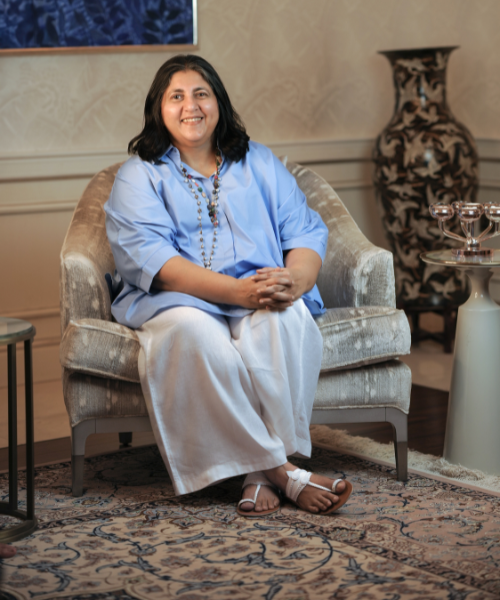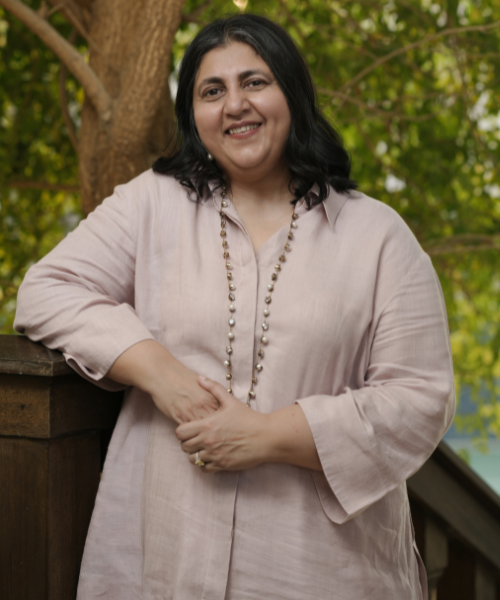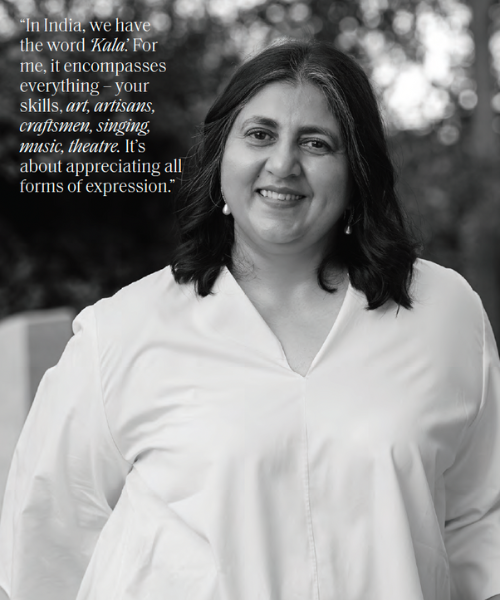In the quiet, art-filled sanctuary of her home in Sharjah, Shabana Faizal, Vice-Chairperson KEF Holdings, Co-Founder of Faizal and Shabana Foundation and Founder of QissaGoi, is crafting a cultural legacy.

To step into Shabana Faizal’s home is to step into a gallery of her memories. Each wall speaks – adorned with pieces that chart the expansive map of her passions. A vibrant, dancing figure by Indian master M.F. Husain holds court alongside an intricate night sky painting by Jethro Buck. Abstract forms converse with traditional designs, creating a visual symphony that is both personal and profound. The collection is a reflection of a life lived in deep conversation with art. And the presence of Shabana’s beloved cats, weaving through the space with nonchalant ease, immediately transforms the grandeur of the art-filled space into that of a warm and welcoming home. Shabana’s impressive journey began with an idyllic childhood in Thumbe, in South India. “It gave me the freedom to be a free spirit,” she recalls, her voice soft with memory.
There the natural world was her preferred playground, filled with animals, birds, and the space to let her imagination run wild. She would spend hours building her own little houses from whatever materials she could find – an early, physical manifestation of the worlds she would later construct through story and art. The most formative influence, however, was the sound of her father’s voice. He was a storyteller, weaving tales of the Mughals, of Shah Jahan’s love for Mumtaz, and the architectural poetry of the Taj Mahal. He would recount these stories with such detail, Shabana recalls, that she could almost see them come to life in front of her eyes.

“He created a world for me where I could actually look into whatever story he was saying,” she says. “That sense of wonder is what actually got me interested in art.” It’s a feeling that Shabana continued to nurture over her lifetime, a constant companion and quiet hum beneath the surface of a life that took a more conventional path. It led her to marriage, motherhood, and a move to the UAE in 1995, where she joined her husband Faizal Kottikollon in the family business, KEF Holdings. Yet, even there, she satisfied her creative hunger in inventive, tangible ways. She found herself drawn to the scrap yard, seeing potential in discarded industrial pieces. A large pipe was transformed into a majestic boardroom table; other metal scraps were reborn as sculptures that dotted the office. She initiated annual art exhibitions for every employee, from the shop floor to the executive suite, believing firmly that the urge to create is universal.
Three years ago Shabana decided to launch her art and culture foundation QissaGoi, which means storytelling in Persian. Encouraged and inspired by her children – Sophiya, Sarah, Ahmed Zachariah, and Czarina – the foundation is the physical manifestation of a long held desire to create a platform for Eastern stories to be told, and more importantly shared with the wider world. “I wanted to tell stories from South Asia and the Middle East,” she explains. “This region is my home. I feel humans are connected. So what is it that connects us? That is the central question for us at QissaGoi,” she explains.
This philosophy of connection is woven into the very fabric of all of Shabana’s endeavors. She speaks with particular warmth about a recent project in Nabha, India, where QissaGoi worked with women artisans skilled in the traditional embroidery of Phulkari. In a deeply patriarchal society, the initiative went beyond craft. It was about building a cooperative, providing training in marketing and finance, and, most importantly, fostering self-worth in women. “Once the family realised that she is doing something and she is earning money out of it, it was a different respect she got,” Shabana shares, highlighting how transformative the activation was for many of the women. “It was like teaching them to fish so they can survive on their own and lead a more fulfilling life. At least they have a say now in their family.”
This drive to create impact is a family philosophy, channelled through the Faizal and Shabana Foundation. While the foundation has transformative projects, like in education – turning government schools into vibrant, model institutions – QissaGoi allows Shabana to focus her philanthropic energy on the intangible heritage of art and culture. For her, it is all part of the same thread. “In India, we have the word ‘Kala’,” she shares. “For me, it encompasses everything – your skills, art, artisans, craftsmen, singing, mu-sic, theatre. It’s about appreciating all forms of expression.” With QissaGoi, Shabana is deliberate about creating a platform that is approachable, a space where a child, a student, or a connoisseur can feel an equal sense of belonging.

Shabana’s own personal collection also reflects this thoughtful, evolving curatorial eye. She speaks of her first major acquisition, the M.F. Husain painting, ‘Kathak Dance Performance at the Maharaja Darbar’, with the fondness of a first love. She spent a year with an art advisor, visiting galleries, understanding mediums, and discovering her own taste. “I realised I like fabrics, I like Mughal art, and miniatures,” she says. This led her to another cherished piece: a 17th-century Deccani manuscript named ‘Rustam’s Audience With Kay Qubad’, so intricate it requires a magnifying glass to read. Shabana says that she is drawn to the colour blue, which washes over many of her chosen pieces, and to the meditative quality of artists like Jethro Buck, who reinterpret the miniature style for a contemporary gaze.

‘Kathak Dance Performance at the Maharaja Darbar’ – M.F. Husain
As someone who believes life is ever-evolving, her perspective has recently been profoundly deepened by her latest role, that of a grandmother. The arrival of her granddaughter, Nuri – a name that means ‘my light’ – has united four generations: Shabana, her mother, her daughter Sophia, and now the newest member of the family. “Seeing the four generations of women at the same time makes me feel that there is something very important we need to pass down,” she reflects, with a smile. She has already told Sophia that she will be Nuri’s mentor in art and culture, a commitment that adds a new layer of urgency to her work. “Having my mom and my granddaughter in the same room has cemented the importance of what Qissagoi is doing.”
Shabana acknowledges the challenges of passing down tradition in a world of social media and dispersed identities. It is a reality she understands intimately. “You get confused, who are you really?” she muses, speaking of the duality of feeling at home both in the UAE and in India. This is why QissaGoi’s ‘Third Culture Taboos’ talks, held at the Paus wellness club and cafe in Dubai, provide a safe space for conversations often left unspoken.
Shabana’s mission to connect people more deeply to their culture and heritage continues to unfold through a slate of ambitious projects: documenting fading traditions, championing the Kochi- Muziris Biennale as a trustee of its foundation, and creating a video series on the UAE’s legacy-bound cultural businesses. In these roles, and as a Global Advisory Committee Member for the Indiaspora Forum 2026, Shabana does more than preserve the past. She weaves its most vital threads into the tapestry of the future, ensuring the stories that connect us are never broken.
– For more on luxury lifestyle, news, fashion and beauty follow Emirates Woman on Facebook and Instagram
Images: Supplied
Disclaimer : This story is auto aggregated by a computer programme and has not been created or edited by DOWNTHENEWS. Publisher: emirateswoman.com






